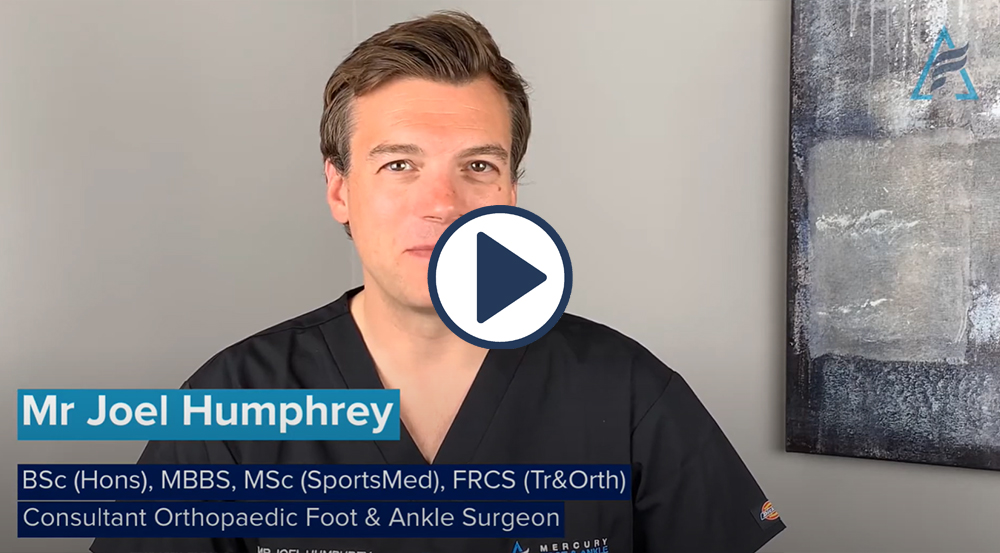Big Toe Arthritis

What is big toe arthritis?
Big toe arthritis develops when the main joint of the big toe (first metatarsophalangeal joint) has damaged or worn out cartilage. It is characterised by pain, swelling and stiffness. Usually symptoms develop gradually overtime. Big toe arthritis is also known as hallux limitus or hallux rigidus depending on the severity of the condition.
What are the causes of big toe arthritis?
The main joint of the big toe is prone to arthritis, as significant forces are transmitted through the joint when walking. Big toe arthritis can also be caused by repetitive micro-trauma in active individuals, a previous fracture of the big toe or other medical conditions (for example rheumatoid arthritis or gout).
What are the symptoms of big toe arthritis?
Pain in the main joint of the big toe, which usually occurs when the big toe bends upward whilst walking or running, but can even cause discomfort at rest.
Stiffness in the main joint of the big toe, with the ability of the big toe to bend upwards either restricted or lost.
A bony bump (dorsal osteophyte) may develop on the top of the main joint of the big toe, with associated soft tissue swelling. The bony bump can rub on shoes and restrict certain footwear.
What are the available treatments for big toe arthritis?
In the first instance simple treatment measures are recommended to try and reduce your symptoms. These can have significant benefit and help avoid having surgery. Some of the treatments for big toe arthritis are listed below, but it is not exhaustive.
Appropriate footwear that consists of a deep toe box or soft upper top can reduce the bony bump rubbing on shoes. Also a stiff sole or rocker-type sole can restrict the big toe from bending upwards and aggravating your symptoms.
An orthosis (a medical insole) can be useful in improving foot function and reducing pain. You can be referred to the Orthotist for a specialist opinion.
Simple painkillers such as paracetemol, ibuprofen or anti-inflammatory gels can reduce pain. Ask advice from your doctor or pharmacist before taking anti-inflammatory medicines as they can have side-effects in some people.
Physiotherapy for movement may be useful in the early stage of the condition.
Weight loss if you are overweight can also be useful in reducing pain.
Steroid injections into the main joint of the big toe, although are more invasive, can help reduce pain and inflammation.
Surgery for big toe arthritis is only recommended as a last resort, once all simple treatment measures have been exhausted and if your symptoms remain significant. It is not recommended for cosmetic reasons or to avoid problems that are not yet present. The two most recognised forms of surgery are a big toe cheilectomy or a big toe fusion.
Other options include a big toe joint resection (Keller procedure), synthetic cartilage implant (Cartiva) or joint replacement surgery (total-arthroplasty or hemi-arthroplasty). If you wish to consider any of these options, they need to be discussed in-depth with your surgeon.
Wellbeing Advice
Patients that have a healthy diet, take regular exercise and refrain from smoking are more likely to experience a quicker recovery with a more successful outcome from their surgery.
If you have any concerns about your general health and well-being (diet, exercise, smoking cessation) you are encouraged to discuss this with your GP, who will be able to provide advice on the options available to you.
We hope this leaflet has answered any questions you might have. If you have any further queries, please feel free to discuss them with any of the medical or nursing staff.
Testimonials

My condition had deteriorated to the point that I was unable to walk for extended periods of time without pain and swelling of the ankle, and I would rarely be able to join in most family activities. The support and guidance provided by Mr Ramasamy were exemplary and enabled me to make a fully informed decision regarding the options available to me. Now, the pain is much more manageable and the stability that the treatment has provided is such that I feel that I regained a significant part of my life and as such my confidence.
I found Mr Ramasamy extremely professional and reassuring. On the day of my procedure I received the most efficient, organised and professional care in my life. Your nurses were the best I have ever experienced. Mr Ramasamy’s team, in theatre made me feel at ease and made the whole procedure more bearable. They go way beyond the extra mile for their patients.
I wanted to share my excellent experiences and compliment Mr Ramasamy and his team. I found him extremely professional and reassured that he understood how much pain I was in. On the day of my procedure, it was the most efficient, organized and professional care I have ever received – from checking into reception to being allocated a bay and taken into theatre – your nurses in the recovery area were the best I have ever received. Mr Ramasay’s team, especially in theatre, made me feel at ease, kept me informed throughout the whole procedure and made the whole procedure more bearable.
Send Us A Message

If you have a question or want to reach out to us directly, use the contact form below and send us a message.








